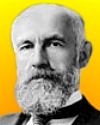 (source)
(source)
|
G. Stanley Hall
(1 Feb 1844 - 24 Apr 1924)
American psychologist who distinguished experimental psychology in the U.S. from the philosophical psychology that dominated in America at the time. He developed child psychology and educational psychology.
|
Science Quotes by G. Stanley Hall (12 quotes)
... every step of the upward way is strewn with wreckage of body, mind, and morals.
— G. Stanley Hall
Adolescence: Its Psychology and Its Relations to Physiology (1904), Vol. 1, xiv.
All possible truth is practical. To ask whether our conception of chair or table corresponds to the real chair or table apart from the uses to which they may be put, is as utterly meaningless and vain as to inquire whether a musical tone is red or yellow. No other conceivable relation than this between ideas and things can exist. The unknowable is what I cannot react upon. The active part of our nature is not only an essential part of cognition itself, but it always has a voice in determining what shall be believed and what rejected.
— G. Stanley Hall
The Muscular Perception of Space (1878), 446.
Being an only child is a disease in itself.
— G. Stanley Hall
As quoted in Dorothy Stein, People who Count: Population and Politics, Women and Children (1995), 111, citing T.L. Smith (ed.) Aspects of Childhood Life and Education (1907).
Constant muscular activity was natural for the child, and, therefore, the immense effort of the drillmaster teachers to make children sit still was harmful and useless.
— G. Stanley Hall
Quoted in Bill McKibben, Maybe One: A Personal and Enviromental Argument for Single-Child Families (1998), 19.
Education has, thus, become the chief problem of the world, its one holy cause. The nations that see this will survive, and those that fail to do so will slowly perish. There must be re-education of the will and of the heart as well as of the intellect, and the ideals of service must supplant those of selfishness and greed. ... Never so much as now is education the one and chief hope of the world.
— G. Stanley Hall
Confessions of a Psychologist (1923). Quoted in Bruce A. Kimball, The True Professional Ideal in America: A History (1996), 198.
Every theory of love, from Plato down, teaches that each individual loves in the other sex what he lacks in himself.
— G. Stanley Hall
Quoted in Values of the Wise: Humanity's Highest Aspirations (2004), 195.
If a teacher is full of his subject, and can induce enthusiasm in his pupils; if his facts are concrete and naturally connected, the amount of material that an average child can assimilate without injury is as astonishing as is the little that will fag him if it is a trifle above or below or remote from him, or taught dully or incoherently.
— G. Stanley Hall
In The North American Review (Mar 1883), No. 316, 289.
Muscles are in a most intimate and peculiar sense the organs of the will. They have built all the roads, cities and machines in the world, written all the books, spoken all the words, and, in fact done everything that man has accomplished with matter. Character might be a sense defined as a plexus of motor habits.
— G. Stanley Hall
Youth, Its Education, Regimen and Hygiene (1907), 7.
Normal children often pass through stages of passionate cruelty, laziness, lying and thievery.
— G. Stanley Hall
Adolescence (1904)
The teens are emotionally unstable and pathic. It is a natural impulse to experience hot and perfervid psychic states, and it is characterized by emotionalism. We see here the instability and fluctuations now so characteristic. The emotions develop by contrast and reaction into the opposite.
— G. Stanley Hall
Hall, GS (1904b). Adolescence: Its psychology and its relations to physiology, anthropology, sociology, sex, crime, religion and education (1904), Vol. 2, 74-75.
There is no more wild, free, vigorous growth of the forest, but everything is in pots or rows like a rococo garden... The pupil is in the age of spontaneous variation which at no period of life is so great. He does not want a standardized, overpeptonized mental diet. It palls on his appetite.
— G. Stanley Hall
Hall, GS (1904b). Adolescence: Its psychology and its relations to physiology, anthropology, sociology, sex, crime, religion and education (1904), Vol. 2, 509.
This splendid subject [mathematics], queen of all exact sciences, and the ideal and norm of all careful thinking...
— G. Stanley Hall
Educational Problems (1911), Vol. 2, 393.
See also:
- 1 Feb - short biography, births, deaths and events on date of Hall's birth.
 In science it often happens that scientists say, 'You know that's a really good argument; my position is mistaken,' and then they would actually change their minds and you never hear that old view from them again. They really do it. It doesn't happen as often as it should, because scientists are human and change is sometimes painful. But it happens every day. I cannot recall the last time something like that happened in politics or religion.
(1987) --
In science it often happens that scientists say, 'You know that's a really good argument; my position is mistaken,' and then they would actually change their minds and you never hear that old view from them again. They really do it. It doesn't happen as often as it should, because scientists are human and change is sometimes painful. But it happens every day. I cannot recall the last time something like that happened in politics or religion.
(1987) -- 


